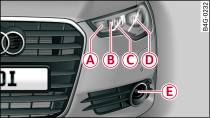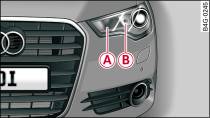-

- Fig. 1 Halogen headlights (overview of left side of vehicle)
-

- Fig. 2 Xenon headlights (overview of left side of vehicle)
Changing bulbs requires a certain degree of practical skill.
LED headlights* and LED rear lights*
are maintenance-free. The bulbs cannot be changed. For repairs,
please contact a qualified workshop.
If you decide to change bulbs in the engine compartment yourself,
be aware of the safety risks involved
WARNING!.
You must only replace a bulb with a bulb of the same type. Information
regarding e.g. the wattage can be found on the base of the bulb.
Halogen headlights
On vehicles with halogen headlights
Fig. 1,
you can change the following bulbs yourself:
Xenon headlights*
On vehicles with xenon headlights
Fig. 2,
you can change the following bulbs yourself:
- Take particular care when working on components in the engine compartment if the engine is warm - risk of burns!
- Bulbs are sensitive to pressure. The glass can break when you touch the bulb, causing injury.
- Do not change xenon* gas-discharge bulbs yourself. Incorrect handling of the high-voltage element of xenon gas-discharge bulbs can have potentially fatal consequences.
- When changing bulbs, please take care not to injure yourself on sharp edges, in particular on the headlight housing.
Caution!
- Always switch off the ignition before carrying out any work on the electrical system - danger of short circuiting!
- Switch off the lights or parking lights before you change a bulb.
- Take good care to avoid damaging any components.
For the sake of the environment
Please ask your specialist retailer how to dispose of used bulbs
in the proper manner.
Note
- Please check at regular intervals that all lighting (especially the exterior lighting) on your vehicle is functioning properly. This is not only in the interest of your own safety, but also in that of all other road users.
- Before changing a bulb, make sure you have the correct new bulb.
- Do not touch the glass part of the bulb with your bare hands, use a cloth or paper towel instead. Otherwise, the fingerprints left on the glass will vaporise as a result of the heat generated by the bulb, be deposited on the reflector and impair its surface.
